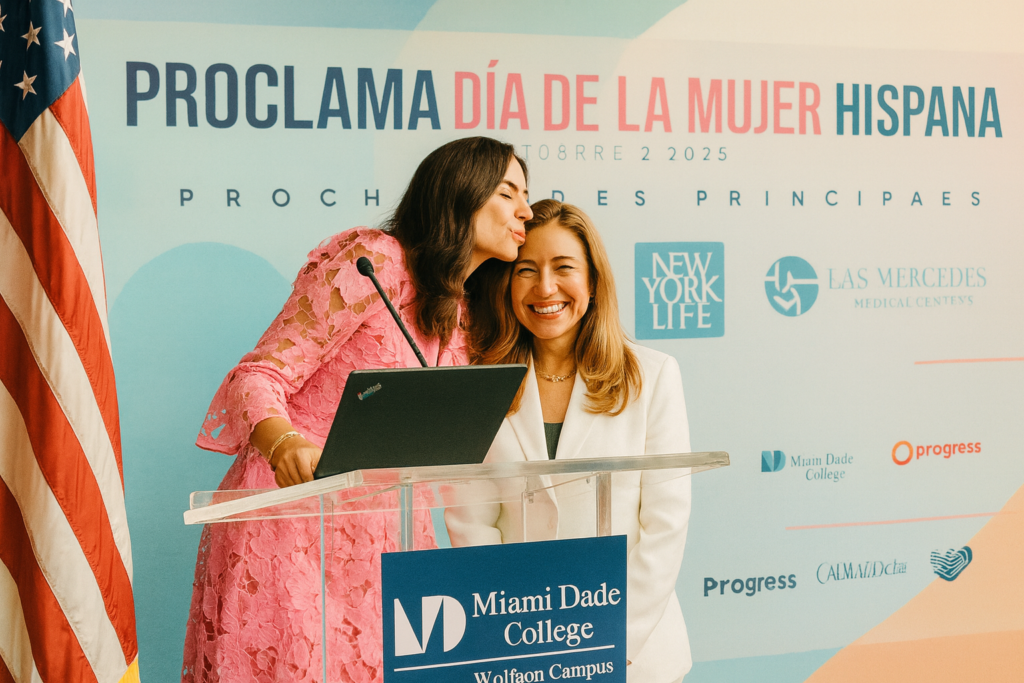
Downtown yesterday: a date that became a symbol
On October 2, Miami wrote a new page in its history: the State of Florida and Miami-Dade County officially proclaimed Hispanic Women’s Day during a ceremony at Miami Dade College – Wolfson Campus, right in Downtown. The proclamation took place within Hispanic Heritage Month, reinforcing Miami’s cultural and social identity.
The act was led by the Women’s Chamber of Commerce in the United States, under the presidency of Yamilet Rivas, a well-known Latina entrepreneur and advocate. She emphasized that this initiative recognizes the economic, social, and cultural impact of millions of Hispanic women across the U.S.
Who is Yamilet Rivas?
Yamilet Rivas is a tech entrepreneur and President of the Women’s Chamber of Commerce in the United States (CAMACOM). She has built her career empowering Latina entrepreneurs through mentorship, advocacy, and visibility platforms. By spearheading this proclamation, Rivas positioned the event as more than symbolic—it became a statement of leadership, community, and long-term inclusion.
Institutional representation
The ceremony brought together local officials and community leaders. Among the attendees and invited representatives were Eileen Higgins (Miami-Dade Commissioner, District 5) and Christi Fraga (Mayor of Doral). Their participation reflected the support of local government in making Hispanic women visible and celebrated as central to Miami’s growth.
A national gesture with local pride
One of the most symbolic moments came with the presentation of a U.S. flag that flew over the Capitol, sent for the occasion from Washington. The gesture highlighted that Hispanic Women’s Day is not only a Miami cause but part of the national conversation.
Community, business and culture at the center
The spotlight of the evening was on entrepreneurs, professionals, cultural leaders, and Latina networks. Groups such as Latinas in Tech and Latinas in Business joined women entrepreneurs and executives who shared how they built companies, launched startups, and created artistic and cultural projects that now define Miami’s identity.
The event blended stories of resilience with cultural expression: Latin music performances, art exhibitions, and fashion with a Latin touch. It reminded everyone that Hispanic women are not just leaders in politics and business—they are also the heart of Miami’s cultural DNA.
Why this date matters
- It names and celebrates a leadership role that has always been there, but rarely recognized.
- It institutionalizes memory: schools, media, and organizations will now celebrate October 2 every year.
- It projects Miami internationally as a city that embraces inclusion, diversity, and Latina leadership.
- It adds value to business and tourism: making Miami more attractive for conventions, festivals, and global events.
The symbolic stage
The MDC Wolfson Campus was no coincidence. Known for hosting the Miami Book Fair and major cultural programs, it represents diversity and accessibility. Holding the proclamation there sent a message: this day belongs to the entire community, not just to a select few.
What was felt, and what remains alive
What was felt: pride, hope, tears of joy. Generations came together—pioneers with decades of work, young innovators with their first startups, artists and community leaders.
What remains alive: the responsibility to ensure this proclamation is not just another post on social media. It must turn into tangible actions—funding access, STEM education for young Latinas, more visibility for Latina-owned businesses, and policies that open real spaces of power.
Voices that shaped the day
Yamilet Rivas delivered a central message: Hispanic Women’s Day must go beyond a symbolic date. She urged businesses, governments, and communities to keep activating networks and creating spaces where Latina women can thrive. Her vision, rooted in tech leadership and entrepreneurship, gave the proclamation both legitimacy and urgency.
Closing with a future horizon
October 2 is no longer just a date—it is a social contract. Miami has acknowledged that Hispanic women are the city’s present and future. Without them, the city does not create, innovate, or grow.
From this year forward, every October 2 will remind the world: Miami’s strength is built by Latina women who don’t wait for permission to lead.
Hispanic Women’s Day is official. And Miami celebrates it as proof that this city is without precedent.





